Central Europe’s foreign policy preferences in the post-pandemic world

With the Coronavirus pandemic and the rapidly changing great power competition outside as well as within the European Union, the tectonic plates of political affairs collided from the frustration with epidemiological shocks and an economic downturn. This consequently affected certain foreign policy preferences.
For example, 85 percent of Central Europeans would support greater unity amongst the EU on the global stage for Europe’s voice to be amplified in matters of national and European interest amidst the global reboot, according to the last GLOBSEC’s opinion polls.
CEE, in particular, are aware that such unity may be achieved if states pursue cooperation in converging policy fields, such as negotiations with the United Kingdom and sanctions policy towards Russia. The recent Taliban resurgence in Afghanistan, moreover, further serves as an example where this voice may be taken advantage of. In all, the concept of “politics of scale” is not unknown to smaller EU members.
Back to the European project
After Brexit, the blow to the “Big Three” constellation has not gone unnoticed. Central Europe expected a shift in the internal EU power balance that could potentially jeopardise their position vis-à-vis the big powers. The fears circled around the controversial concept of the “multi-speed Europe” that would leave CEE on the periphery, and an absence of the British ally in counterbalancing further EU integration and initiatives supporting European strategic autonomy.
After Britain’s leaving, however, the “Franco-German motor” of the European project remained mostly untouched. Here, Germany continues to stand out as CEE’s key strategic partner with 57 percent perceiving the relationship, resting not solely on economic dependency but also political alignment, as vitally important, with mainly Austrians, Czechs and Slovaks holding this view. On average, France and the UK rank lower, according to the same poll.
These preferences are far from being set in stone: with the French and German elections around the corner, these perceptions may be shaken up by electoral outcomes in the coming months.
Central and Eastern Europe's relationship with Germany, for instance, following Angela Merkel’s departure from the Chancellery, will need to adjust to fighting its own battles if the new CDU/CSU, SPD or the Green Party’s winning candidate does not follow Merkel’s deep cultural understating of the region.
Strategic partners and unequivocal rivals
On the global front today, the East-West dynamic is even more inconclusive. While the EU has long endeavoured to construct strategic partnerships, which would enable Europe to strengthen its position internationally, Central and Eastern European countries reflect a sense of division as to who such a partnership should be formed with and to what extent.
Outside of Europe, though Brussels has endured Donald Trump’s reign of nativist and unilateralist politics, the name of the US President does not impact CEE perceptions on how important the US is. Especially Poland and Lithuania are in favor of preserving wide-reaching relations with Europe’s transatlantic partner.
As long as America’s interest lies in Central Europe – in terms of military presence, political support, and awareness of its security sensibilities – the US will continue to occupy a large part of its foreign policy preferences. In other words, undervaluing Transatlanticism is largely unimaginable regardless of who resides in the White House.
Russia earns the title of being a strategic partner by large numbers as well, reaching as much as 47 percent in Slovakia and 45 percent in Bulgaria. This is unsurprising since the two countries have long expressed their sympathies towards the “Slavic bear”. Yet, the support for a partnership with Moscow has increased in all CEE countries apart from Czechia since 2020.
Contrarily, China, despite its engagement in the region and pursuit of vaccine “mask” diplomacy, does not harness sizeable support amongst Central Europeans with only one-third of Hungarians in favor of forming stronger links with Beijing. Overall, China’s strategy to sway CEE towards its reach, which includes the delivery of the Sinovac vaccine, is not meeting with considerable success as merely 11 percent indicate such a position.
The difference in attitudes is likely affected by a historical national identity, political culture, and the power of societal narrative. Here, China’s soft power efforts have a long way to go to transform the perceptible strategic rivalry into a partnership that CEE can trust. That said, the recent evidence suggesting Russia’s involvement in the 2014 explosion in Vrbětice does not add to the Czech support for Moscow either.
Europe in the centre, Brussels on the side-lines
Apart from these tempestuous power relations, Europe stands amid an increasingly relevant competition between the United States and China, both of whom represent a major trading partner of the bloc. If this strife emerged into one where the EU would need to get actively involved, Central and Eastern Europe would be more inclined to support Washington.
Despite this, 67 percent of CEE respondents would nonetheless opt for a neutral position that would allow Europe to set its policy towards either of the countries. Europe’s neutrality trumps any sort of taking sides.
Moving forward, there is a great deal of convincing resting on Brussels’ shoulders for CEE not to prioritise its own relationship with other states which do not conform to the EU’s norms and rules. Needless to say, the EU’s foreign and security policy, which requires unanimity, is the last policy area that could be seen as easily adaptable to diverging member states’ preferences.
Either Central Europe becomes more involved in the process of dealing with third countries and is enabled to raise its own concerns regarding, for example, the Nord Stream 2 pipeline and the EU-China Comprehensive Agreement on Investment, or the gap between CEE public opinion and EU’s policymakers will widen even further.
The EU has time and time again proved its ability to adapt to new challenges but now it seems this trait needs to be more inward-looking. After all, this fragmentation in public opinion – primarily towards Europe’s external partners – is unlikely to disappear anytime soon.
For more information, read GLOBSEC’s Mind the Opinion: Stronger Together for a Stronger EU – Public Opinion Across 10 Central and Eastern European Countries on Foreign Policy.
Disclaimer:
This article is published within GLOBSEC's GEOPE – “Geopolitical Europe: are the EU member-states ready for it?” project supported by Jean Monnet Actions of the EU’s Erasmus+ program.
The European Commission support for the production of this publication does not constitute an endorsement of the content, which reflects the views only of the authors, and the Commission cannot be held responsible for any use which may be made of the information contained therein.
This article was originally published on New Europe's website on 27 August 2021.

